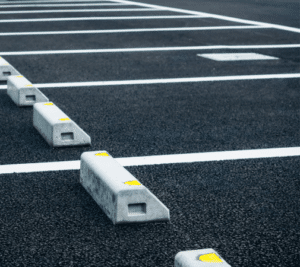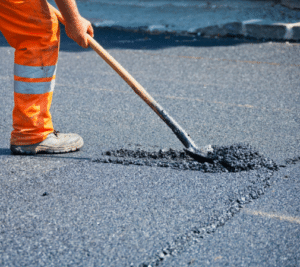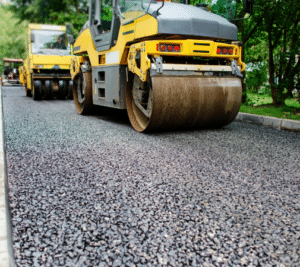Driveway resurfacing is a popular way to give a fresh new look to your driveway without the expense of a complete replacement. This process involves adding a new layer of material, such as concrete or asphalt, to your existing driveway surface to cover up minor damages and imperfections, giving your driveway a brand-new appearance.
Benefits Of Driveway Resurfacing
Driveway resurfacing offers many benefits compared to replacing an entire driveway. By resurfacing your driveway, you can quickly and easily transform your home’s look without worrying about the cost or disruption of a complete replacement. Additionally, resurfacing is much less labor-intensive than replacing a driveway, requiring only a few days for installation rather than weeks or months. Furthermore, this process helps to protect the underlying driveway surface, increasing its lifespan and offering better protection against weather damage.
Drawbacks Of Driveway Resurfacing
The primary downside of resurfacing is that it requires a lot of preparation, including clearing the existing driveway of debris and removing any existing asphalt or concrete. Additionally, although this process can fill in minor cracks and imperfections, it will not fix deeper issues such as large cracks or significant heaving. You may need to opt for a complete replacement instead of resurfacing in these cases.
When Is It Time to Resurface Your Driveway?
As a homeowner, your driveway is essential to your property’s curb appeal. Not only does it provide a functional purpose, but it can also enhance the beauty of your home’s exterior. However, driveways can become worn down and damaged over time, leading to safety hazards and an unsightly appearance.
Knowing when it’s time to resurface your driveway is crucial to maintaining the safety and value of your property. Here are some signs that indicate it’s time for a driveway resurfacing project:
Cracks and Potholes: If you notice cracks or potholes in your driveway, it’s a sign that your asphalt or concrete is deteriorating and the structural integrity is compromised. As these cracks and potholes worsen, they can lead to drainage issues, tripping hazards, and even vehicle damage.
Fading or Discoloration: If your driveway’s color has faded or is discolored, it may be a sign that the surface has been exposed to the elements for too long and is now prone to damage. A faded or discolored driveway looks unsightly and can detract from your home’s overall appearance.
Standing Water: If water is pooling on your driveway after rain or snow, it’s a sign that your driveway is not draining correctly. Standing water can accelerate the damage to your driveway, leading to potholes, cracks, and even structural damage.
Aged Appearance: If your driveway is outdated or has an aged appearance, a resurfacing project can breathe new life into your property’s exterior. A fresh layer of asphalt or concrete can instantly improve your driveway’s aesthetic appeal while improving your home’s overall value.
If you notice any of these signs, it’s time to consider a driveway resurfacing project. At Saguaro Asphalt, we specialize in all types of driveway resurfacing services, using top-quality materials and equipment to ensure a flawless finish. Contact us today to schedule a consultation and take the first step toward a newer, safer, and more beautiful driveway.
How Much Does Driveway Resurfacing Cost?
The cost of resurfacing a driveway depends on several factors, such as size, materials used, and the extent of the damage. On average, resurfacing typically ranges from $1 to $4 per square foot. If your driveway requires more extensive repairs or you’re using higher-end materials, the cost can go up to $8 per square foot.
Other factors that can affect the resurfacing cost include access to your property, the complexity of the job, and local labor rates. To get an accurate estimate for your driveway resurfacing project, it’s best to contact a professional contractor for a consultation.
Maintaining Your Resurfaced Driveway
Maintaining your resurfaced driveway is essential to preserving its beauty and functionality. To ensure that your driveway stays in top condition, there are a few simple steps you can take:
Repair Cracks Promptly: As soon as you notice any cracks or potholes forming in your resurfaced driveway, you must address them as quickly as possible. Small gaps can be filled with an asphalt patching compound, while larger cracks may require professional repair.
Seal Coat: The best way to protect your resurfaced driveway from the elements is to apply a seal coat every two to three years. This helps to prevent water and other debris from penetrating the surface and keeps it looking its best for longer.
Clean Regularly: To keep your driveway in top condition, it’s important to regularly sweep away any dirt, leaves, or other debris that has accumulated. You can use a pressure washer to remove harder-to-remove substances like oil or grease for deeper cleaning.
Following these simple steps ensures that your resurfaced driveway stays in top condition for years.
Professional Resurfacing
Professional resurfacing is the best way to ensure a high-quality result for your driveway. With professional resurfacing, you can trust that the job will be done correctly and to the highest standards. A professional contractor will use top-quality materials and equipment to ensure a flawless finish. They will also have the expertise and experience needed to properly assess the current condition of your driveway and determine the most suitable solution.
If you need driveway resurfacing services, contact Saguaro Asphalt today. Our team is composed of experienced and knowledgeable professionals who are committed to providing superior results. We specialize in asphalt and concrete resurfacing projects, from repairs to complete installations. Contact us to schedule a consultation and get started on your driveway resurfacing project today.



